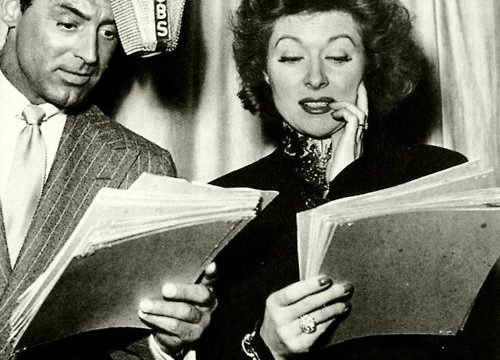Every now and again for this column, I’m going to celebrate a thing, not a person. Something that I feel doesn’t get discussed much in talks about film history. I don’t do this with Celebrating the Living, but for some reason, it feels right here. For this week, I want to talk about the interesting phenomenon that was movies on the radio and in particular the Dissolve Couch’s beloved Lux Radio Theatre—and, yes, they spelled it “re.”
When it began on 14 October, 1934, it was a presentation of the Broadway success Seventh Heaven. For the next two years, the shows were primarily of Broadway plays, something few listeners could attend. However, whether it was its shift from NBC Blue to CBS, or the choice of Cecil B. DeMille as its new host, or the move from New York to Hollywood, the show began doing movies instead. Whenever possible, in both incarnations, the goal was to cast as many of the original stars as possible, whether they were film or stage. The adaptations were about an hour, less time for introductions, station breaks, and of course the all-important ads for Lux Toilet Soap.
It’s a weird concept, even though the movies had usually been out a while before the episode was aired. Remember that “wide release” wasn’t quite the same thing in those days, and the six months between the movie’s release and the radio version didn’t guarantee that the movie had arrived in your town yet. Not only that, but while they tried to get the original performers, they didn’t always succeed; Katharine Hepburn appeared once, for an adaptation of The Philadelphia Story, even though quite a few of her movies were adapted for the show. And you figure Don Ameche wasn’t a completely successful replacement for James Stewart in The Shop Around the Corner.
And yet it lasted until the days of television, becoming, of course, Lux Video Theatre. It spawned any number of imitators, including one strictly for MGM films. I suppose it was similar to home video; you could listen to the movie on the radio from the comfort of your own home, even if it didn’t get to your town or you were bedridden or something. But you didn’t get to choose what movie they did, and it wasn’t the same cast, and it was trimmed to fit the time available. So not a complete replication of the theatrical experience, then.
One thing the episodes did become is a built-in special feature for later DVD and Blu-Ray releases of movies; check your Criterion or other fancy releases of movies for the radio version of the movie, and you’re bound to find a few. Many of the scripts are available online, and of course that’s what we use in our Saturday Night Script Reads. There are certain recurring tropes in the episodes; the fact that it’s sponsored by a soap company probably suggests a few to you. Also the fact that the show lasted from 1934 to 1955, meaning there was a hint of sexism, a touch of racism. How bad it is varies from episode to episode—and how good the scripts are. But it’s a surprisingly solid collection, even if all 926 individual episodes aren’t.

